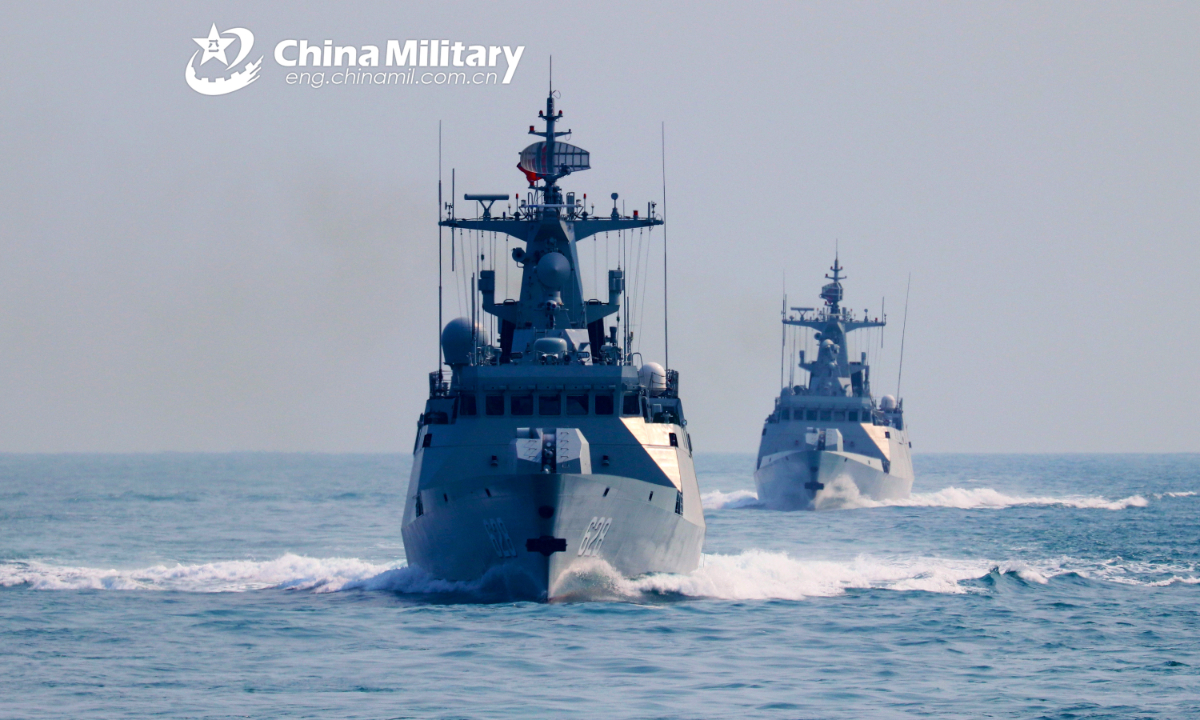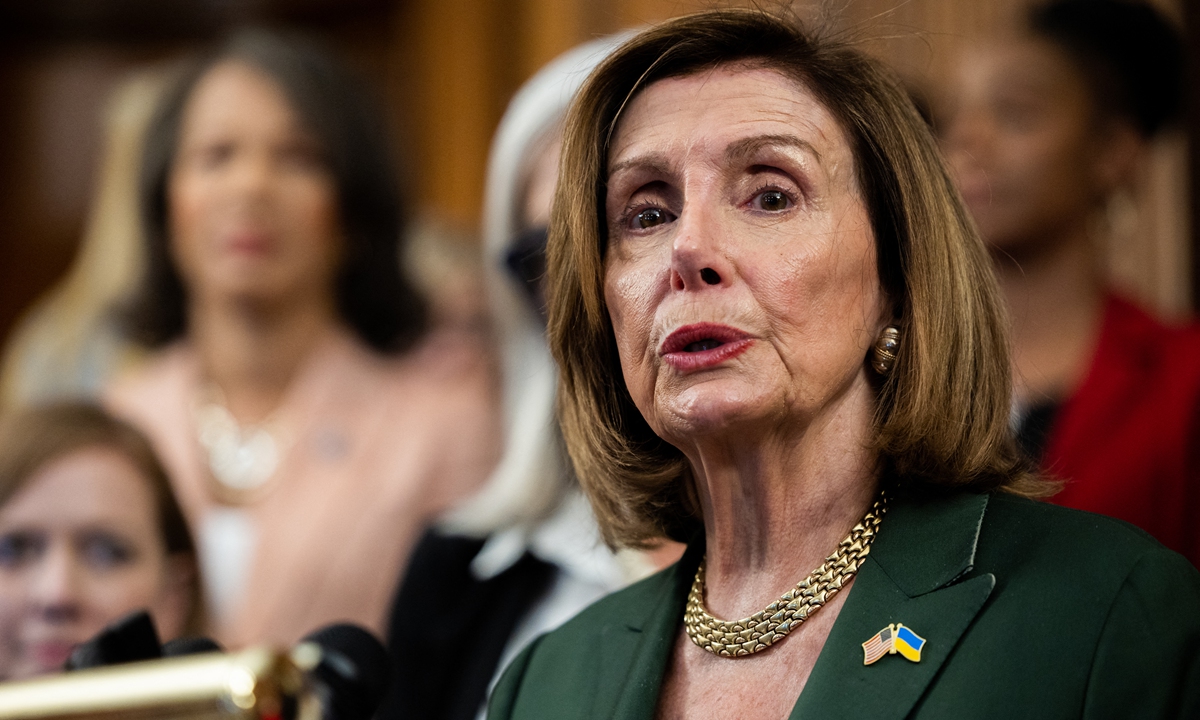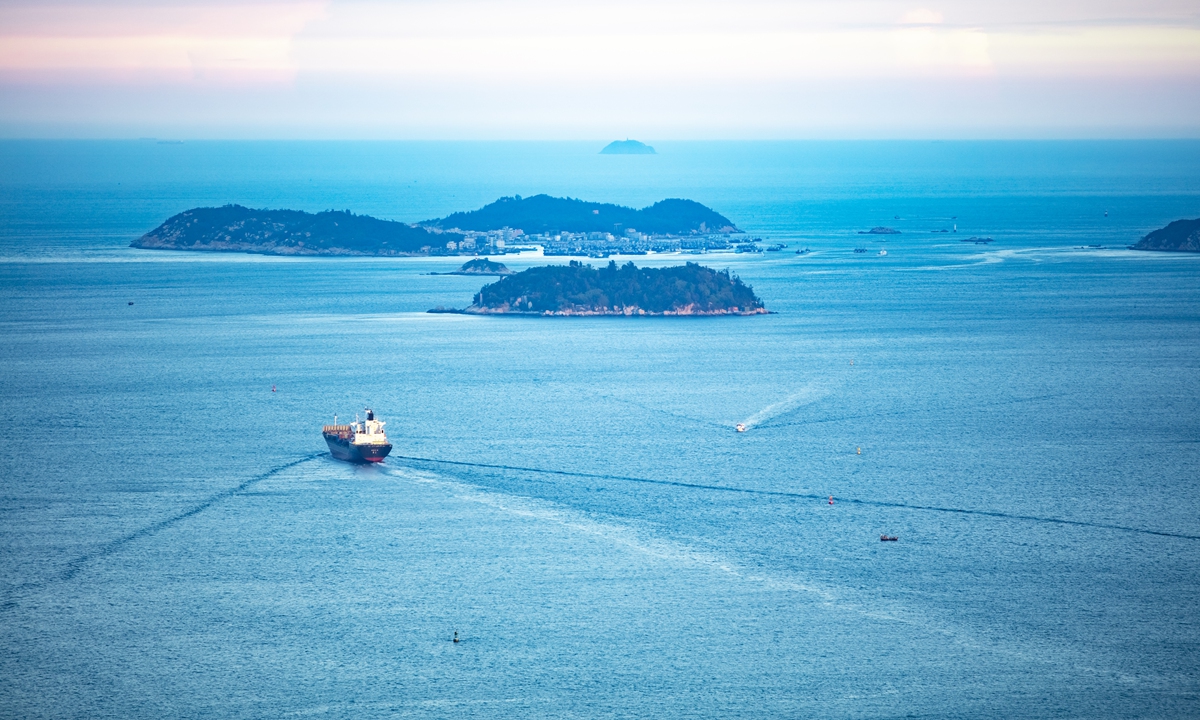
Led by the guided-missile frigate Yongzhou (Hull 628), a frigate flotilla with the navy under the PLA Southern Theater Command steams in formation in an undisclosed sea area during a maritime training exercise in early December 2020. Photo: China Military
"Don't say we didn't warn you!" - a phrase that was used by the People's Daily in 1962 before China was forced to fight the border war with India and ahead of the 1979 China-Vietnam War, was frequently mentioned during a forum held Friday by a high-level Chinese think tank, as analysts warned that open military options and comprehensive countermeasures ranging from the economy to diplomacy from China await if US House Speaker Nancy Pelosi gambles with a visit to the Taiwan island during her Asia tour.
On Thursday night, Chinese President Xi Jinping held a phone conversation with US President Joe Biden, during which he once again warned the US about the seriousness and significance of the Taiwan question and said, "Public opinion cannot be defied. Those who play with fire will perish by it. It is hoped that the US will be clear-eyed about this."
In the recent week, in response to Pelosi's potential visit to the island of Taiwan, a string of warnings have also been made by different ministries and departments of China. On Friday, the Institute of Taiwan Studies in Chinese Academy of Social Sciences - the highest-level think tank - held a forum with analysts and discussed the damage of Pelosi's possible Taiwan island visit to the China-US relations, cross-Straits stability and regional and global peace, and China's countermeasures.
Sending fighter jets to intercept Pelosi's plane, declaring air and maritime zones around the island of Taiwan as restriction zones for military exercises … China's responses will be systematical and not limited to small scale given the severity of Pelosi's move and the damage to the political trust of China-US relations, Yang Mingjie, head of the Institute of Taiwan Studies in Chinese Academy of Social Sciences, told the Global Times.

US House Speaker Nancy Pelosi speaks on women's healthcare issues inside the US Capitol in Washington, DC on July 28, 2022. Pelosi led a delegation to Japan, South Korea, Malaysia and Singapore the following day while it is unclear whether she will make a stop in the island of Taiwan. Photo: AFP
Pelosi is leading an official congressional delegation to Japan, South Korea, Malaysia and Singapore in Asia starting Friday and it is unclear whether the trip will include a stop in the island of Taiwan, US media reported.
The US military had reportedly expressed safety concerns to Pelosi but later played down worries that China may shoot down Pelosi's plane in case she visits the island of Taiwan, and said the US military will increase movement of forces and assets in the Indo-Pacific region.
Yang noted that China has reiterated its opposition to Pelosi's possible visit and used the phrase "yanzhen yidai" - literally meaning "streamlining army formation to wait for the enemy" - to show that we have made all preparations for combats or any challenges.
There are multiple measures the PLA can take once Pelosi flies to the island of Taiwan. For example, Chinese fighter jets can fly along with and monitor the plane that Pelosi takes and fly over the airport where her plane lands in Taiwan, Wang Yunfei, a naval expert, told the Global Times.
The PLA can also declare air and maritime zones around the island of Taiwan as restricted zones to resist Pelosi's plane. Chinese fighter jets can also fly across the island to start a new model to fight against the military actions of secessionists on the island, Wang said, noting that sending missiles surrounding the island of Taiwan and conducting military drills are also options.
Analysts on the military also noted that the PLA can conduct large-scale military drills around the island of Taiwan, including on the waters between Taiwan island and Japan as well as between Taiwan island and Guam. The PLA drills would also include joint efforts of all PLA service branches, with all combat elements including electronic warfare, missile and long-range rocket strikes, seizing of air superiority and control of the sea, amphibious landing, as well as anti-access and area denial against external military interference.
Live-fire drills will be held and waters near Pingtan in Fuzhou, East China's Fujian will be sealed from 8am to 9pm on Saturday, the local authorities announced on Friday. Pingtan is 125 kilometers away from the island of Taiwan.

A view of the Taiwan Straits is seen from Xiamen port, in East China's Fujian Province. Photo: IC
During the forum, many analysts noted that the military response from the Chinese mainland will be larger in scale and upgraded from the ones during the 1995-96 crisis of the Taiwan Straits.
In responding to key initiator of "Taiwan separatism" Lee Teng-hui's visit to the US, the PLA took a series of military drills from July 1995 to March 1996 in the waters surrounding the island of Taiwan.
"China was not strong enough during the Taiwan Straits crisis in 1995-96, but didn't hesitate to take a military response. The answer for the current situation is clear considering its current political and economic strength … If this can be tolerated, what cannot?" said Leng Bo, an expert from the Institute of Taiwan Studies in Chinese Academy of Social Sciences, noting this time the military response will be larger than any other time.
The backdrop of Pelosi's visit is different from that of the 1995-96 crisis - China-US relations have changed, the comparison of strength between China and the US has changed, and the island of Taiwan itself has changed - and the way the mainland will cope with Pelosi's visit will be different and may bring wider consequences and impact, Wu Yongping, director of the Institute of Taiwan Studies, Tsinghua University, told the Global Times.
Wu noted that the Chinese mainland's countermeasures will be comprehensive in military, diplomacy, economy and public opinions. If Pelosi insists on making the visit, China can turn the incident into an opportunity to take control of the Taiwan Straits situation and push the reunification process, and such consequence should be borne by the island and the US as the international community will also clearly see the provocation from the US and that any actions China will take are out of determination to defend its sovereignty.
"If so, will Pelosi regret catalyzing China's reunification process?" Wu asked.
The phrase "Don't say we didn't warn you" had also been frequently mentioned by analysts when talking about the disastrous consequences that may be brought about by Pelosi during the Friday forum.
"Don't say we didn't warn you" has become a key phrase used by Chinese official media as the most severe warning previously issued before shots were fired in military operations. The phrase has been used several times before, such as in 1962 and 1978, not long before China's military operations against provocations by Indian and Vietnamese troops, respectively.
"The US should not underestimate the Chinese people's determination to defend core interests on sovereignty, integrity and security at any time. It should also not repeat the miscalculation it made in the 1950s in the Korean War. Despite not being strong at that time, China still had the courage to fight a war when it was pushed to the corner, it will surely not sit idly by this time," said Yang.
The countermeasures in China's toolbox include concrete and strategic ones and rapid and long-term ones and it will take different measures in accordance with Pelosi's interactions with secessionists from the island of Taiwan. If she makes the visit, the possibility for China to recall the ambassador from the US cannot be ruled out, analysts said, also referring to imposing sanctions on individuals related to the visit.
Many analysts also stressed that once Pelosi visits the island of Taiwan, it will escalate the cross-Straits tensions, greatly damage the political trust of China-US relations, and bring disastrous effects to regional peace and economy.
Pelosi, out of her paranoid anti-China ideas and selfish political interests, has provoked the Taiwan question and sent a seriously wrong signal to the secessionist forces in Taiwan. If it leads to the intensification and loss of control of secessionist activities, it is detrimental to US national interests and it is the US that has to foot the bill, said Zhu Weidong, deputy director from the Institute of Taiwan Studies in Chinese Academy of Social Sciences.
While the Chinese and US leaders are improving communications to control disputes, Pelosi is intent on such political stunt to break the consensus reached by the top leaders, which displays the domestic political mess in the US, analysts said, urging the Biden administration to play its role in fulfilling promises to China.
Historical experiences show that for decades, as long as the relationship between China and the US develops well, the Taiwan question is handled properly. If the US challenges China's core interests, not only will China-US relations be turbulent, it will have a negative impact on the entire Asia-Pacific and even slow the recovery of global economy, Zhu said.
Bilateral cooperation between China and the US, especially on the economy, global supply chain, energy and food security are important to help solve global challenges and some urgent problems the US is facing with. However, what Pelosi has done and may do will have negative influence in these fields, said analysts.






